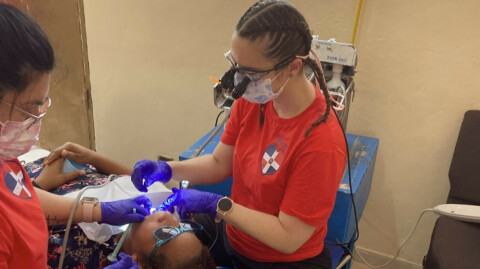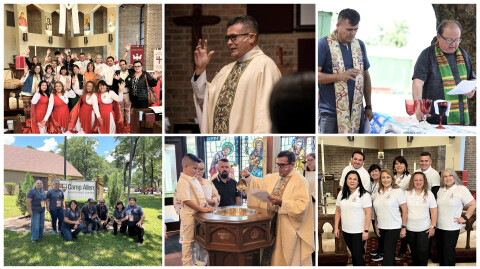The blind man of John 9:1-41 goes through an incredible process of discovery as he tries to understand who Jesus is. When his friends ask him who healed him, he responds, “That man Jesus made mud...” Later on when the Pharisees ask him for his opinion of Jesus, he responds, “He is a prophet.” Lastly when Jesus reveals to him that he is the Son of Man, the blind man calls Jesus “Lord” and worships him. He moves from an understanding of Jesus as just another man, to ascribing him the title of prophet, to the full recognition of him as the Messiah.
The Samaritan woman of John 4:5-42 went through a similar process of discovery. When she first meets Jesus, she calls him “A Jew.” Later on during her long conversation with Jesus, she calls him “Sir” twice. Later, when talking to those in the village about Jesus, after he reveals his identity to her, she wonders if Jesus might be the Messiah. By the end of the passage the woman and the villagers come to believe that Jesus is “truly the Savior of the world.” Like the blind man, she has moved from viewing Jesus as another Jewish man to the full recognition of Jesus as the Savior of the World.
I often wonder how we introduce Jesus as the Savior of the world today. How do the “Samaritan Villagers” of the world come to know Christ and his Gospel? How do the Blind Man’s neighbors around the globe hear what Jesus has to offer them?
If we are to be honest, what passes for evangelism in many churches is the process through which we move sheep from one pen to another. In order to do this, we highlight our programs, ministries, fellowship opportunities, and what is unique about our pen. We ask ourselves, “What can we offer that other denominations are not offering?” I believe this is the wrong question. Neither the Samaritan Woman nor the Blind Man had sophisticated programs and ministries to offer their villages. They did not have multi-layered marketing plans. What they had was a personal encounter with Jesus of Nazareth. They had experienced healing, forgiveness and restoration, and now they tell their people about the Messiah. For evangelism to work it has to be based on a personal encounter with Jesus, and it is most effective when it is done within the context of a loving relationship between two people.
I had an interesting experience several years ago. I was at a Goodwill store, dressed in my Anglican collar, looking very much like a priest. An older woman approached me and asked, “Can I ask you a question, young man?” I expected a question about theology, the Bible, or the Episcopal church. She looked at me and asked, “Have you accepted Jesus as your Lord and Savior?” My first reaction was to feel insulted. After all, wasn’t my uniform sufficient proof that I was a minister? I took a breath and told her, “I think I have, but tell me what you mean by the question.” What followed was a heart-wrenching story of pain and redemption, sin and forgiveness, being utterly lost and despised and then being found and loved. I found myself by the used book department, tears in my eyes, being evangelized about what it truly means to accept Jesus’s love and unconditional forgiveness. My evangelist was not worried that I looked religious, after all, the Pharisees also looked religious during the time of Jesus. She was not interested in bringing me to her pen and she did not have sophisticated programs to offer. All she knew was that she had been spiritually blind and now she could see.
Behind the layers of formalism in most mainline denominations, you often find broken sinners at the foot of the cross: forgiven, free, and saved not because of anything of value they offer God, but because of the loving sacrifice of Jesus on the cross. At the end of the day, this is what Christianity is all about. I pray you and I may have the courage to share our story of faith with those who are in need of God’s grace in Jesus.
May he continue to bless you,
Fr. Roman+





